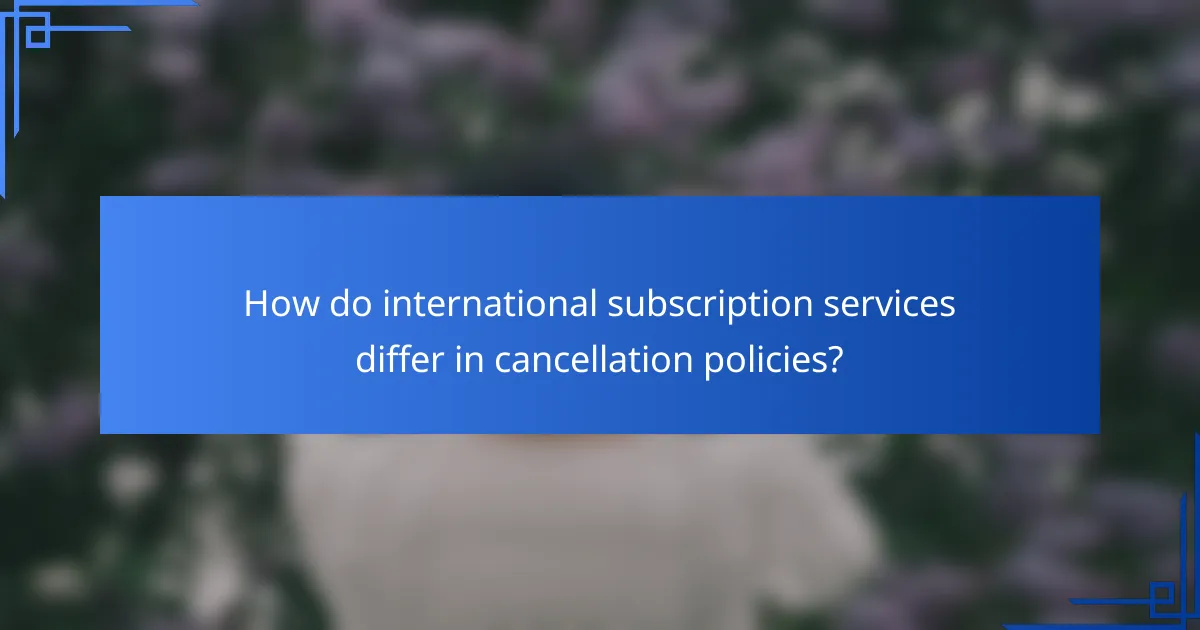Subscription services often come with varying cancellation policies that can significantly impact users’ experiences. In the US, users typically have the right to cancel at any time, but understanding the specific procedures and timeframes is essential to avoid unexpected charges. Similarly, in the UK, flexibility in contract adjustments and cancellations can differ, making it crucial for users to review the terms carefully. Awareness of user rights is vital for managing subscriptions effectively and ensuring a smooth cancellation process.

What are common subscription service cancellation policies in the US?
In the US, cancellation policies for subscription services vary widely but generally allow users to cancel at any time, often with specific procedures and timeframes. Understanding these policies is crucial for users to avoid unexpected charges and ensure a smooth cancellation process.
Standard cancellation procedures
Most subscription services require users to follow specific cancellation procedures, which can typically be found in the service’s terms of use. Common methods include online cancellation through the user account, contacting customer support, or submitting a cancellation request via email.
It’s advisable to keep a record of the cancellation confirmation, whether it’s an email or a screenshot, to avoid disputes regarding billing after cancellation.
Timeframes for cancellation
Cancellation timeframes can differ significantly between services. Some subscriptions allow immediate cancellation, while others may require notice periods ranging from a few days to a month. For example, streaming services often permit cancellations at any time, while gym memberships may have longer notice requirements.
Users should check the specific terms related to their subscription to understand how long it takes for the cancellation to take effect and whether they will be billed for the next cycle if they cancel close to the billing date.
Impact of cancellation on billing
The impact of cancellation on billing can vary based on the subscription model. Many services will stop charging users immediately upon cancellation, while others may allow access until the end of the current billing cycle, meaning users can still utilize the service until that period concludes.
It’s essential to review the billing policies to determine if any final charges will apply or if users will receive a refund for any unused portion of their subscription. Being aware of these details can help users avoid unexpected fees after cancellation.

How flexible are subscription services in the UK?
Subscription services in the UK vary in flexibility, with many offering options for contract adjustments, pauses, or cancellations. Users should carefully review the terms of each service to understand their rights and available options.
Flexibility in contract terms
Many subscription services in the UK provide flexible contract terms, allowing users to choose between monthly, quarterly, or annual billing cycles. Monthly subscriptions typically offer the greatest flexibility, enabling users to cancel or change their plans with minimal notice, often just a few days before the next billing date.
However, annual contracts may come with discounts but usually require a longer commitment. Users should assess their usage patterns and financial commitments before selecting a plan to avoid potential penalties for early termination.
Options for pausing subscriptions
Some subscription services in the UK allow users to pause their subscriptions temporarily, which can be beneficial during periods of reduced usage. This option is often available for services like streaming platforms or meal kits, where users can suspend their deliveries without incurring cancellation fees.
Typically, the pause duration can range from a few weeks to several months, depending on the provider. Users should check the specific terms and conditions, as some services may limit the number of pauses allowed per year or require users to notify them in advance.

What are user rights regarding subscription cancellations?
User rights regarding subscription cancellations vary by jurisdiction but generally include the ability to cancel a subscription and receive a refund under certain conditions. Consumers should be aware of their rights to ensure they can effectively manage their subscriptions and avoid unexpected charges.
Consumer protection laws
Consumer protection laws are designed to safeguard buyers from unfair practices in the marketplace, including subscription services. In many countries, these laws require clear disclosure of cancellation policies and terms before a consumer commits to a subscription.
For instance, in the European Union, the Consumer Rights Directive mandates that businesses provide information about cancellation rights and processes. This ensures that users can make informed decisions and understand their rights regarding subscription cancellations.
Right to cancel within a cooling-off period
The right to cancel within a cooling-off period allows consumers to change their minds shortly after subscribing, typically within 14 days. During this time, users can cancel their subscription without incurring penalties or fees.
To exercise this right, consumers usually need to notify the service provider in writing or through a designated cancellation process. It’s essential to check the specific terms of the subscription, as some services may have different policies regarding cooling-off periods.

What factors influence cancellation policies?
Cancellation policies are shaped by various factors including the type of subscription service and the level of market competition. Understanding these elements can help users navigate their rights and options when considering cancellation.
Type of subscription service
The type of subscription service significantly impacts its cancellation policy. For instance, streaming services often allow users to cancel anytime without penalties, while subscription boxes may require notice a few days before the next billing cycle. Users should review the specific terms associated with their service to avoid unexpected charges.
Some services offer flexible cancellation options, allowing users to pause subscriptions instead of fully canceling. This can be beneficial for those who may want to resume their subscription later without losing their account or benefits.
Market competition
Market competition plays a crucial role in shaping cancellation policies. Companies in highly competitive markets tend to offer more lenient cancellation terms to attract and retain customers. For example, if several streaming platforms offer similar content, they might provide easier cancellation options to encourage sign-ups.
Conversely, in less competitive markets, companies may impose stricter cancellation policies, knowing that customers have fewer alternatives. Users should compare cancellation policies across similar services to find the most favorable terms before committing to a subscription.

How do subscription services handle disputes?
Subscription services typically manage disputes through established customer service protocols and escalation procedures. These processes are designed to address user complaints effectively and ensure fair resolutions.
Customer service channels
Most subscription services offer multiple customer service channels to resolve disputes, including email support, live chat, and phone assistance. Users should check the service’s website for specific contact options, as response times can vary significantly across channels.
For example, email responses may take a few hours to a couple of days, while live chat often provides immediate assistance. It’s advisable to have account details and any relevant documentation ready when contacting support to expedite the process.
Escalation procedures
If initial contact does not resolve the issue, users can typically escalate their dispute. This may involve requesting to speak with a supervisor or submitting a formal complaint through the service’s website. Each service has its own escalation policy, so it’s crucial to familiarize yourself with these steps beforehand.
Some services may also offer a mediation process or involve third-party arbitration for unresolved disputes. Understanding these procedures can help users navigate the dispute resolution landscape more effectively and ensure their rights are upheld.

What are the trends in subscription service flexibility?
Subscription services are increasingly adopting flexible models that cater to diverse consumer needs. This trend reflects a shift towards offering customizable options, allowing users to adjust their subscriptions based on personal preferences and usage patterns.
Emerging subscription models
New subscription models are emerging that prioritize flexibility, such as pay-as-you-go and tiered pricing structures. These models enable users to select plans that align with their consumption habits, avoiding unnecessary costs. For instance, streaming services may offer different tiers based on the number of screens or quality of content, allowing users to choose what suits them best.
Additionally, some services are introducing short-term subscriptions or trial periods, which provide users with the opportunity to test the service before committing long-term. This approach reduces the risk for consumers and encourages more people to try new offerings.
Consumer demand for more options
There is a growing consumer demand for subscription services that offer more options and flexibility. Users are increasingly seeking the ability to pause, modify, or cancel their subscriptions without facing penalties. This demand has prompted many companies to revise their cancellation policies, making them more user-friendly.
To meet this demand, businesses are implementing features like easy online cancellation and the ability to switch plans seamlessly. For example, fitness apps may allow users to pause their memberships during off-seasons or offer flexible payment schedules. Companies that adapt to these preferences are likely to retain customers and attract new ones.

How do international subscription services differ in cancellation policies?
International subscription services often have varying cancellation policies that reflect local regulations and business practices. Users should be aware of these differences to avoid unexpected charges or complications when attempting to cancel their subscriptions.
Cancellation Notice Periods
Cancellation notice periods can differ significantly across countries. In some regions, users may need to provide notice several days or weeks in advance, while others allow for immediate cancellation. For example, in the EU, consumers often have a 14-day cooling-off period for online subscriptions, allowing them to cancel without penalty.
In contrast, some services in the United States may require a 30-day notice before cancellation takes effect. Always check the specific terms of service for the subscription to understand the required notice period.
Refund Policies
Refund policies for cancelled subscriptions can vary widely. Some services offer full refunds if cancellation occurs within a specified timeframe, while others may provide partial refunds or none at all. For instance, a subscription service in Canada might refund users for unused months, while a service in Australia could have a strict no-refund policy.
It’s crucial to read the fine print regarding refunds before subscribing. Look for terms that specify how refunds are handled upon cancellation to avoid surprises.
Flexibility and User Rights
User rights regarding cancellation and flexibility can differ based on local consumer protection laws. In many European countries, users enjoy strong rights that allow them to cancel subscriptions easily and receive refunds. In the U.S., however, these rights can be less robust, often leaving users with fewer options.
When considering a subscription, evaluate the flexibility of the cancellation policy. Services that allow for easy cancellation and clear communication are generally more user-friendly. Always ensure you understand your rights as a consumer in your country to make informed decisions.
